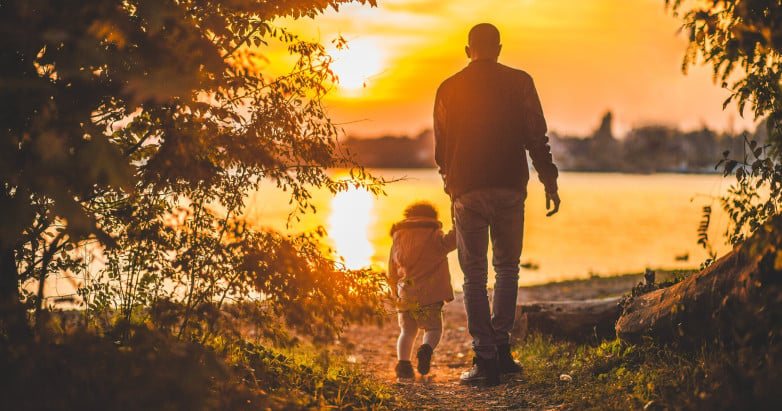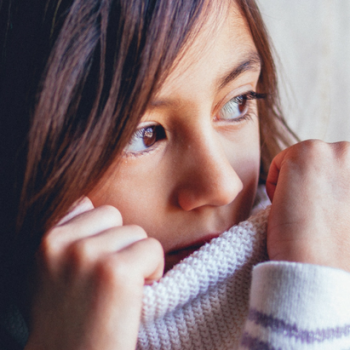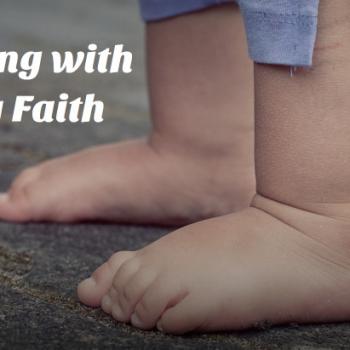I’m in a tiny, sleepy Indiana town. It’s 1984. It’s where I was born, where my family attends a Missionary church, where many residents farm in addition to whatever other jobs they may do. Our stocky, kindly, elderly next door neighbor sometimes lets me look at the squirrels he catches in live traps in his yard, but I’m not thinking about the squirrels now. Instead, with the summer foliage hanging heavily overhead in the Indiana humidity, I’m sitting with Dad in his rusting Ford Mustang. He’s explaining the plan of salvation; he leads me through the sinner’s prayer. My unformed but very verbal four-year-old mind grasps that if I repeat the words, Jesus will somehow live in my heart and keep me from horrible punishment in hell. So, with my parents not wasting any time or taking any chances on an age of accountability, I ask Jesus into my heart. Within a year I will start to show symptoms of OCD that, after a few sessions with a counselor that I don’t remember much about, will not be properly followed up on.

Circa 1987. My family lives in a two-story house in a north suburb of Indianapolis now, and some Wednesdays my younger sister and I go to Awana with the family down the street. (My mind still reflexively recalls John 3:16 in the King James translation, rather than the NIV that we would prefer later.) My family goes to a Baptist church that meets in our Christian school’s elementary gymnasium, and then to a Wesleyan church with its own building. The neighbors down the street who go to Awana have three kids, eventually four. We kids often run free through the middle class neighborhood; once in a while we make new friends. At some point we meet Jimmy, a portly little boy with a winning smile. We discover that Jimmy has never asked Jesus into his heart. My heart pounding, I convince Jimmy to let me lead him through the sinner’s prayer. I feel both very uncomfortable and somehow accomplished. By this time, most nights I don’t lie awake crying, repeating the sinner’s prayer over and over in a state of severe anxiety.
1991. Late last year Dad became the music minister at an Independent Christian church, so that’s where we go to church now. We live in the same house with beige siding and a colorful metal swing set in the backyard, situated beneath a tall maple tree. My room is upstairs; I’m a fan of its light green shag carpet. My room houses my parents’ old record player. I don’t have many records, but sometimes I put on Mom’s old collection of 1950s rock hits and let myself go, dancing around wildly to Chuck Berry’s “Johnny B. Goode” and Del Shannon’s “Runaway.” I don’t hear a lot of other secular music, unless it’s show tunes, but I eagerly read Mom’s old natural history textbook, and Ranger Rick Magazine, which my grandma subscribed me to, and Mom’s old Beverly Cleary novels. I know there is a secular world out there. I know some people believe in evolution.
But at the moment I’m not thinking about any of that. I’m standing in front of my dresser, my bare feet digging into the shag carpet, staring into the open sock drawer. Perhaps this is not long after the time that my sister and I tried to get our cats to kneel so we could walk them through the sinner’s prayer. But why am I standing still, anxious, unable to simply choose a pair of socks and get on with the day? The problem is that I am not sure which pair of socks it is God’s will for me to put on. Perhaps if I put on the right pair of socks, it will somehow lead to a conversation in which I can help someone get saved. And what if I fail to listen to the Holy Spirit instead? Will I be punished? Will I be able to live with myself?
Circa 1998. Our high school Bible teacher takes us to pass out tracts in downtown Indianapolis. As we are trained in or exhorted to evangelism in Christian school Bible classes and chapel services, as well as during Sunday morning church services, church leaders often repeat how urgent it is to reach children for Jesus before they turn 18, citing statistics about how few adult conversions there are as if this is the greatest crisis the world faces. They don’t pause to ask whether there is anything manipulative or untoward in seeking to convert impressionable children. People’s very souls are on the line, eternity is on the line, and you want to think about ends and means?
One day I ask my mom, who teaches in our Christian school, to try to imagine a Muslim mother who believes as strongly in Islam as she does in Christianity, to consider how that mother would feel if her children came home converted to Christianity by strangers. This does not especially compute. Our chapel speakers and church pastors rave about the gravity of eternity. “If you had the cure for cancer, you would share it, wouldn’t you? Then why are you afraid to witness, when a person’s soul lives for eternity in heaven or hell? Are you ashamed of the Gospel of Christ?” The chapel speaker rails on, but I’m still stuck on that reference to sharing the cure for cancer. Our community is unanimous in its opposition to universal healthcare. Do these people listen to themselves? I hate passing out tracts in downtown Indianapolis, but I do it anyway. I have felt ill at ease for a few years, and my crisis of faith has become acute, but I do not yet know how to call all of this out as abuse. I will try to hold on through college and into grad school, and even in grad school I will often dissimulate with my family or just keep quiet about what I really do and don’t believe.
2017. Over the last few years, after some two decades of deconstruction from hardline Evangelical indoctrination, I am finally able to articulate my thoughts about the abusive nature of Evangelicalism. And make no mistake: while all proselytizing entails objectification, efforts to convert other people’s children through church camps, VBS, or other “outreach” events are particularly predatory. Meanwhile, scaring your own impressionable children into praying the sinner’s prayer via visions of hell, and then sending them out to convert their unbelieving neighbors, friends, and relatives, is abuse. Full stop. No child should have to face that kind of pressure, the kind that drew me into the cycle of abuse as I made the occasional attempt to convert someone else’s child through the horrifically exploitative practice of “friendship evangelism.”
Every now and again, I wonder what happened to Jimmy, with whom I lost touch decades ago, and whose last name I have long since forgotten. I hope he wasn’t ultimately scarred by abusive Christianity to the extent I was. If you’re out there, Jimmy, I’m sorry for pressuring you to “ask Jesus into your heart.” I didn’t know any better. But you, parents, reading this blog? To be very frank, you should know better. You can do better. As a childhood spiritual abuse survivor continuing to deal with fallout and depression, I ask you, please, to break the cycle.
Get a free download of a Christian parenting manifesto that helps us guide children into healthy spirituality + a guide on How to Raise a Feminist Son + the most helpful parenting resources with progressive values.












